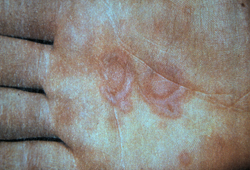Resumen
Definición
Anamnesis y examen
Principales factores de diagnóstico
- presencia de factores de riesgo
- lesiones en diana de las extremidades
- episodio anterior de EM
- erosiones mucosas
Otros factores de diagnóstico
- otras lesiones dianiformes
- inicio rápido de las lesiones
- evolución autolimitada
- vesículas agrupadas sobre una base eritematosa
- roncus, estertores y/o sibilancias
- membranas timpánicas rojas
Factores de riesgo
- episodio previo de eritema multiforme
- infección por virus herpes simple (VHS)
- algunas otras infecciones
- Infección por mycoplasma pneumoniae
- linfoma
- Enfermedad de Kawasaki
- uso de determinados medicamentos
- vacunaciones
- tatuajes
Pruebas diagnósticas
Primeras pruebas diagnósticas para solicitar
- diagnóstico clínico
Pruebas diagnósticas que deben considerarse
- biopsia con hematoxilina y eosina
- biopsia para inmunofluorescencia
- hemograma completo (HC)
- electrolitos séricos
- serología para virus herpes simple (VHS)
- reacción en cadena de la polimerasa (PCR) rápida
- serología por hemaglutinación en frío
- títulos de M pneumoniae
- radiografía del tórax (RT)
- Títulos de autoanticuerpos
Pruebas emergentes
- anticuerpos antidesmoplaquina
Algoritmo de tratamiento
EM menor
EM mayor
EM recurrente
Colaboradores
Autores
Nathan W. Rojek, MD, FAAD
Assistant Professor
Director, Inpatient Dermatology
Department of Dermatology
University of California, Irvine
Irvine
CA
Divulgaciones
NWR declares that he has no competing interests.
Agradecimientos
Dr Nathan W. Rojek would like to gratefully acknowledge Dr Areta Kowal-Vern, Dr Jonathan Silverberg, and Dr Nanette Silverberg, the previous contributors to this topic.
Divulgaciones
AK-V, JS, and NS declare that they have no competing interests.
Revisores por pares
Cristine Radojicic, MD
Staff Physician
Cleveland Clinic
Cleveland
OH
Divulgaciones
CR declares that she has no competing interests.
Brian Swick, MD
Clinical Assistant Professor
University of Iowa College of Medicine
Iowa City
IA
Divulgaciones
BS declares that he has no competing interests.
Agradecimiento de los revisores por pares
Los temas de BMJ Best Practice se actualizan de forma continua de acuerdo con los desarrollos en la evidencia y en las guías. Los revisores por pares listados aquí han revisado el contenido al menos una vez durante la historia del tema.
Divulgaciones
Las afiliaciones y divulgaciones de los revisores por pares se refieren al momento de la revisión.
Referencias
Artículos principales
Lerch M, Mainetti C, Terziroli Beretta-Piccoli B, Harr T. Current perspectives on erythema multiforme. Clin Rev Allergy Immunol. 2018 Feb;54(1):177-84. Resumen
Grünwald P, Mockenhaupt M, Panzer R, et al. Erythema multiforme, Stevens-Johnson syndrome/toxic epidermal necrolysis - diagnosis and treatment. J Dtsch Dermatol Ges. 2020 Jun;18(6):547-53. Resumen
Soares A, Sokumbi O. Recent updates in the treatment of erythema multiforme. Medicina (Kaunas). 2021 Sep 1;57(9):921.Texto completo Resumen
de Risi-Pugliese T, Sbidian E, Ingen-Housz-Oro S, et al. Interventions for erythema multiforme: a systematic review. J Eur Acad Dermatol Venereol. 2019 May;33(5):842-9. Resumen
Artículos de referencia
Una lista completa de las fuentes a las que se hace referencia en este tema está disponible para los usuarios con acceso a todo BMJ Best Practice.

Diferenciales
- Urticaria
- Erupción polimorfa lumínica (PMLE)
- Lupus eritematoso cutáneo subagudo
Más DiferencialesGuías de práctica clínica
- Erythema multiforme
- Diagnosis and treatment of adults with community-acquired pneumonia
Más Guías de práctica clínicaInicie sesión o suscríbase para acceder a todo el BMJ Best Practice
El uso de este contenido está sujeto a nuestra cláusula de exención de responsabilidad